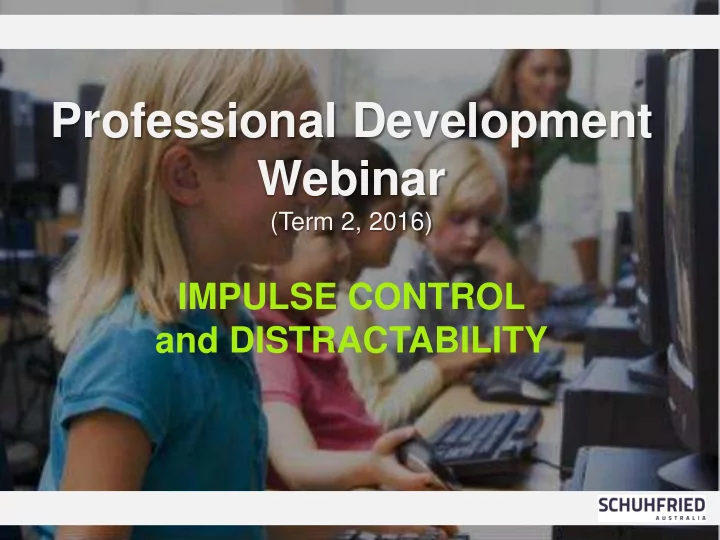

Professional Development Webinar (Term 2, 2016) IMPULSE CONTROL and DISTRACTABILITY
PC users: Your control panel
PC users: Click to see & download handouts
PC users: Click to ask a question
Professional Development Webinar (Term 2, 2016) IMPULSE CONTROL and DISTRACTABILITY
Impulse Control & Distractibility Overview and Definition Determination Regulating Ourselves Willpower Impulse Self-discipline Control Self-control Conscientiousness
Impulse Control & Distractibility Overview and Definition Resist distractions? Regulating Ourselves Inhibit intrusive thoughts? Limit memories from interfering ? Impulse Impulse Control Control Stop attention side-tracking us? Get a handle on emotions? Discontinue inappropriate behaviour? Delay gratification and plan ahead?
Impulse Control & Distractibility Developmental Progression Young children lack the Impulse self-control of older people Control Self-control d e v e l o p s over the years Depends on developmental Biggest changes level between the ages of 3 and 7 But lots of V a r i a t i o n s
Importance of Impulse Control Evidence-based Benefits Consistent Stanford marshmallow studies Evidence Many benefits of controlling one’s impulses Better Finish Greater Less likely on achievement tests their education career success to have troubles Delayed gratification is the key to long term success
Importance of Impulse Control Long-Term Effects of Poor Self-Control One Long-Term Study (age 3 through to age 35) Health issues ● Financial ● Martial issues Criminal records ● Substance dependencies
The Challenge of Impulsivity What is happening to our children? Always been challenging. Appears to be Getting Harder . Increased Diagnosed Cases ADHD, Addition Disorders, Psychiatric Disorders with impulsivity features
The Challenge of Impulsivity What is happening to our children? Impulsivity • Technological advances driving immediacy • Frenziedly and immediate communication patterns (esp., social media) • Ever increasing expectations to secure instant gratification Fuelling impulsivity issues on an unprecedented scale Abandonment Impatience
The Challenge of Impulsivity What is happening to our children? Impulsivity Growing culture of impatience and impulsivity , making us yearn for more and more instant gratification
Impulsivity and Change Is it possible, can we increase self-control? • Self-control can be improved • Impulse control can change (People can change) • Self-control is something that can be taught Parents and teachers can have a profound effect on the development of self-control and self-discipline
Impulsivity and Change Successful Programs for Students Recognise the importance of controlling impulses Reset expectations about learning Successful Find ways to say no to things impulse control Keep temptations and distractions away programs Practice decision-making help students Understand impulsiveness – Use role modelling to… Learning the consequences of actions Just wait before acting to sustain gratification
Developing Impulse Control What strategies are effective with students? Reinforce Impulse Deliver on promises and follow through on Reinforcement when students wait and control impulses. Control Often Use Just-in-Time Use just-in-time reminders just before doing the Reminders task. Limit time to remember reminders. Provide rules that are clear, monitored, reinforced Use Rules & Games to when used, and corrective feedback given when not Build Self-Regulation followed. But introduce rule change progressively . Separate the tasks so that instruction, support and completion occur before moving on to the next task. Manage Task load Use short time breaks, downtime, or simple transition activities. As students grow older, slowly and Sequencing and progressively use multiple step-wise tasks and faster task switching . Watch excessive routinisation.
Developing Impulse Control What strategies are effective with students? Consider points of interest , relevance , or beneficial Use Motivation outcomes in tasks for students. (to address self-control fatigue) Build a Positive Use reinforcement of effort and immediate feedback on the process of learning Mindset Work to the capacity of the student. Use validated Develop Attention tests to determine capacity. Consider cognitive and Working Memory training programs. Talk to students about their feelings , show empathy , Don’t Forget About and discuss constructive ways to cope. Emotions Remind students to plan ahead. Include planning into games . Encourage use of self-talk and Encourage Students verbalisation when planning or solving problems. to Practice Planning Use goal setting (process and outcome). Use action readiness to identify obstacles and prepare responses.
Professional Development Webinar (Term 2, 2016) IMPULSE CONTROL and DISTRACTABILITY
Free Resources 1. Webinars www.neuromite.com.au/webinars • Professional Development • NEUROMITE programs 2. NEUROMITE web site www.neuromite.com.au 3. Free Subscription www.neuromite.com.au/school-resources-login • School Resource Centre online • News updates (e.g. webinar invitations)
Recommend
More recommend